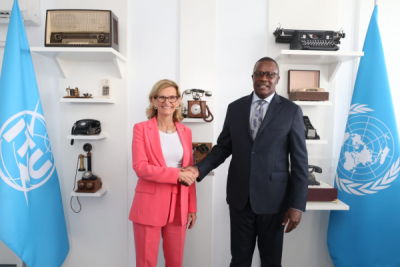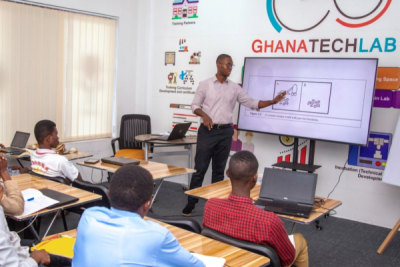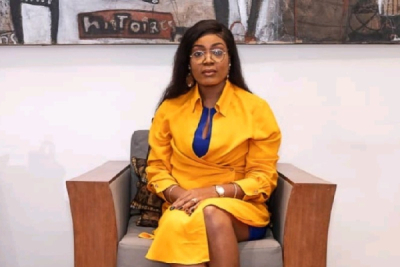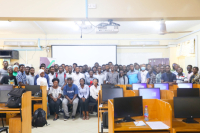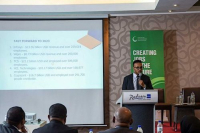Most African countries are dematerializing their administrative services to make their people's daily lives easier. Governments in these countries are now taking further steps to speed up this process.
The government of Senegal has just validated its 2023-2027 digitalization plan for the judiciary sector. The authorities did so during a workshop held on July 13.
The project should cost $13.7 million and result in the establishment of a digital public service of justice that will benefit all of the sector’s actors and users.
"The ownership and implementation of the digital plan for justice by all actors will bring about a revolution in the functioning of justice by allowing faster decisions, simplifying procedures and steps with a more transparent dimension of the procedures. In addition, it will enable users to reduce travel, and magistrates and ministry staff to improve daily work," said Ismaïla Madior Fall, Senegalese Minister of Justice.
In 2016, Senegal adopted its National Digital strategy which aims to digitize approximately 700 administrative procedures. Many investments have been made to ensure this digital transformation in various sectors of activity. Last June, Dakar released $49.8 million as part of the National Program for the Digitalization of the Health System.
For the second half of this year, Ismaïla Madior Fall explained that the project will focus among other things "on the digitization of the process for issuing legal documents and criminal records, the collection of fines, electronic archiving, naturalization, electronic mail management".
Furthermore, the project aims to adapt the texts to dematerialization, to make the working environment suitable; to give citizens remote access to judicial services by dematerializing all judicial procedures; to operationalize alternative justice; to protect children, or to have management tools for the judicial sector.
Adoni Conrad Quenum
Despite having made significant progress in various areas in the past years, Rwanda still faces several issues, such as youth unemployment. Kigali, however, is taking many steps to tackle this specific challenge and help the youth to actively, and productively, contribute to the economy, via the digital sector.
The Rwandan government recently teamed up with the International Labor Organization (ILO) to start a development cooperation project. In a statement dated July 12, 2023, the ILO announced the partnership.
According to the statement, the project will promote youth employment, through digital technologies.
📢Good news for young Rwandans.@ILOAfrica and #Rwanda have announced a new development cooperation project designed to promote #youthemployment in the #digitaleconomy.
— ILO Africa (@ILOAfrica) July 12, 2023
More infos 👇👇https://t.co/0LD9jsA70f via @ILO pic.twitter.com/a8eRuj8s1T
"This project is an exciting milestone in our ongoing efforts to increase investment in the digital economy and uplift Africa's young workforce. It will serve as a new model to generate practical and effective results that will inspire other countries. I am delighted with the potential of this project to serve as a global best practice," said Cynthia Samuel-Olonjuwon, ILO Assistant Director-General and Regional Director for Africa.
Precisely, the project targets young people aged between 16 and 30, in Kigali and secondary towns. It will support job creation and entrepreneurial ventures in the digital economy; help boost youth’s digital skills; and improve public and private employment services provided to the youth.
With a €4 million budget, the project aligns with the Rwanda 2050 Vision, the Rwandan Transformation Strategy 1, the National Skills Development and Employment Promotion Strategy (NSDEPS) 2019-2024, and the Decent Work Country Program for Rwanda.
Once launched, the project will introduce new digital labor market interventions to create new jobs, reinforce existing programs to promote digital skills and stimulate demand for digital services among micro, small, and medium-sized enterprises.
Samira Njoya
Tech is a pillar of Kenya's socio-economic development strategy. Eager to digitize all the country's key sectors, Nairobi is looking for international partners.
The Kenyan Minister of Information, Communications, and Digital Economy, Eliud Owalo (photo, right), recently showcased his country's telecommunications and digital assets in Geneva, Switzerland.
On July 11, speaking at the International Telecommunication Union (ITU) 2023 Council meeting, Owalo noted that Kenya's digital network is ahead of most African countries. He then invited global development partners and investors to support the country’s ongoing digitization program.
"Kenya is keen on partnerships that will equip our youth with digital skills for digital jobs and also develop our ICT infrastructure, using affordable digital devices and finding jobs for young Kenyans in cyberspace," the Kenyan ICT ministry said on Twitter.
1/2 The Cabinet Secretary for Information, Communications and the Digital Economy, Mr Eliud Owalo today was hosted by the Secretary-General of the International Telecommunications Union (ITU), Ms. Doreen Bogdan-Martin, at the ITU Headquarters in Geneva, Switzerland. pic.twitter.com/kVs1HFJhQg
— Ministry of Info, Comms & The Digital Economy KE (@MoICTKenya) July 12, 2023
Over 5,000 government services have been dematerialized since Kenya started its digitization a few years ago; fiber optics are being deployed throughout the country, and public Wi-Fi access points have already been installed in several localities.
While lauding the achievements, Eliud Owalo said there’s still a lot to do. Indeed, if 98% of the Kenyan population has access to mobile phones and broadband services, around 1.7 million people still don’t. Also, about 45% of the population still doesn’t have access to smart devices in the country.
To meet this challenge, the Kenyan government is counting on its various international partners, including the US, with whom the Kenyan delegation has begun talks in Geneva.
1/3 The Cabinet Secretary for Information, Communications and the Digital Economy, Mr Eliud Owalo today held consultations with the leader of the United States Delegation to the 2023 ITU Council Meeting in Geneva, Ambassador at Large, H. E. Nathaniel C Flick. pic.twitter.com/h5Mllmhbdr
— Ministry of Info, Comms & The Digital Economy KE (@MoICTKenya) July 12, 2023
Samira Njoya
Ghana Tech Lab firmly believes in Africa's development through emerging technological innovations. Through its unique programs and courses, the Lab supports budding entrepreneurs, from the idea stage to the creation of a profitable business.
Ghana Tech Lab is a technology innovation center aiming to become a major platform for digital innovations in Africa and beyond. Established in 2018, it has set up an open collaboration space for digital skills training, initiating innovations, and growing startups.
The innovation center offers free digital skills training, startup incubation services, seed funding for innovative ideas, and startup growth. Its team of experts also create solutions to meet the needs of various industries.
Ghana Tech Lab provides entrepreneurs and innovators with technology innovation spaces such as the Makerspace, the creative space, the AI Lab, the Blockchain Lab, the Robotics Lab, the Cybersecurity Lab, the IoT Lab, and the VR/AR lab.
Ghana Tech Lab's core program, which is also its flagship, prepares individuals to think and create new digital solutions. It lasts three months and is divided into two sub-programs. The first is a one-month digital skills training, and the second is a two-month intensive incubation program intended for the top trainees spotted during the training.
The center offers grants to new companies created during and after their incubation. This is to help them turn their ideas into world-class startups. Through its partners, Ghana Tech Lab offers its trainees internship programs, to help them hone their newly-acquired skills.
Since launching, Ghana Tech Lab has trained 3,972 people, created 401 jobs, and incubated 31 startups. The center’s partners include the World Bank, Ghana's Ministry of Communications, the Mastercard Foundation, Kumasi Hive, Innohub, and the Accra Digital Centre.
Melchior Koba
From Banking to Digital Health: Joelle Itoua Owona's Journey in Fostering Global Medical Connections
A Cameroonian native, Joelle Itoua Owona worked in France and the US for many years. She, however, returned to Africa, to the Republic of Congo precisely where she founded an e-health startup.
Joelle Itoua Owona is a banker who moved into e-health. This Cameroonian native founded and is the CEO of AfriWell Health, a medical technology startup, active in the Republic of Congo.
Founded in 2022, the startup provides a digital platform that connects, rapidly and efficiently, patients in Congo with health professionals worldwide. In its first five years of activity, the company aims to create 500,000 patient-doctor connections.
AfriWell Health offers multiple diverse features. It provides services such as online appointment booking and video consultation. It also allows for doctor reviews and online access to medical history. All of these services are aimed at helping Congolese people better manage their health.
The startup is in partnership with several international hospitals, including Euracare in Ghana and Nigeria, the Zaghouan clinic in Tunisia, Memorial and Dent-Health in Turkey, and Narayana Health in India. It is one of the startups selected to take part in the 2023 cohort of the Google For Startups: Women Founders program.
Owona is a graduate of ESCP Business School and the MIT Sloan School of Management. In the former, she earned a master's degree in 2008, and in the latter, she obtained an MBA in Finance in 2016. Prior to venturing into the e-health sector, she worked for several financial institutions in Europe and the US.
In 2008, she worked for Crédit Agricole CIB in France as a junior analyst. In 2009, she joined the HSBC banking group as an international manager in New York, USA. She also worked for Bank of America Merril Lynch from 2016 to 2023 as an investment banker covering healthcare.
Melchior Koba
Fintech is one of the sectors that has grown the most in Africa in recent years. And one of the entrepreneurs who contributed to this growth is Danielle Ekambi Soppo, who strives to advance financial inclusion.
Cameroonian entrepreneur and investor, Danielle Ekambi Soppo, co-founded and heads SuiTch. This is a startup that helps people who have low access to conventional banking solutions, by leveraging digital financial services.
Ekambi Soppo graduated from the Paris Dauphine-PSL University. Between 2007 and 2008, she completed her studies in economic studies and corporate strategies. And in 2011 and 2012, she studied financial engineering, corporate finance, private equity, treasury management, and mergers and acquisitions.
In 2010, she worked as a wealth management consultant at Elite Investment Group, in China. That same year, she went back to Cameroon and worked at the National Shippers' Council of Cameroon (CNCC), as a project financing analyst. She worked there for about a year.
Between 2012 and 2013, she worked at ESSCA Angers business school in banking and risk management. She has also worked as an investment analyst at several investment companies such as Argos Soditic and Platina Partners LLP.
Two years later, in 2015, Danielle Ekambi Soppo founded SuiTch. The startup’s mission is to give people the means to fully tap into the digital economy, enabling them to grow and grow their businesses. The businesswoman offers non-bancarized Cameroonians a mobile payment solution that allows for simple, fast, and secure financial transactions.
SuiTch’s partner companies can grant salary advances to their employees. The startup also gives microcredits, going up to 500,000 FCFA (about $840) to micro and small businesses that use the application.
Danielle Ekambi Soppo currently is the president of the circle of young leaders of Cameroon’s Inter-employer Group (GICAM), which represents the country’s private sector actors. She has also been, since 2014, the managing director of Malaïka Investment Partners, an investment club that supports micro-enterprises with equity and quasi-equity in Cameroon.
SuiTch is presently among Cameroon’s top 7 promising startups. It is also one of the 15 companies picked to join the 2023 cohort of Google for Startups Accelerator: Women Founders.
Melchior Koba
Adopting digital tools continues to prove to be the way forward to development. The Ghana police service is utilizing technology to solve many social issues.
During a recent visit to police stations in Accra, led by IGP Dr. George Akuffo Dampare, the Ghana Police Service (GPS) announced the provision of 150 body cameras to enhance professionalism and strengthen investigative capabilities. The stations that were visited during the tour on July 12 included Tesano Divisional, Achimota District, and Mile '7' police stations.
The body cameras have been assigned to officers of the Visibility Unit in Accra, according to ACP Grace Ansah Akrofi, the Director of Police Public Affairs.
Body cameras are wearable devices used by law enforcement to record events involving officers. ACP Akrofi mentioned their successful use during recent by-elections in Assin North and Kumawu, aiding police operations.
IGP Dr. Dampare emphasized the need to protect the police service's image and support its transformation agenda. He commended officers for their dedication and assured them of continuous support, including logistics and welfare promotion.
The introduction of body cameras and specialized units demonstrates the GPS's commitment to professionalism and improved law enforcement. These technological advancements, coupled with ongoing support and welfare measures, will further strengthen the police service's ability to protect and serve Ghana's citizens.
In 2019, the Ghana Police Service took delivery of 250 body cameras. This was the first batch of 3,000 pieces expected to be delivered by the close of that year as part of efforts to enhance police transparency and accountability.
As part of a GH¢800 million retooling budget for the Ghana Police Service, President Nana Addo Dankwa Akufo-Addo announced the allocation of equipment and vehicles during his State of the Nation Address on February 8, 2018.
Hikmatu Bilali
Smart Africa and Amazon Web Services (AWS) have teamed up to equip youths in several African countries with digital skills. The two partners made the announcement on July 7, 2023.
Specifically, AWS and the pan-African IT-focused organization will deploy the AWS re/Start program via the Smart Africa Digital Academy (SADA), Smart Africa’s capacity-building arm. Initially, the program will cover Ghana, Congo, Kenya, Rwanda, Côte d’Ivoire, and the Democratic Republic of Congo. The program is fully free.
#SADA is excited to lead @RealSmartAfrica’s collaborative initiative with @awscloud aimed at developing #digitalskills across #Africa. Recently launched in #Ghana, this free, cohort-based program will initially span six countries. Read more: https://t.co/OwlvBYuSY9 pic.twitter.com/k8FB9TgkAT
— Smart Africa Digital Academy (@SADASmartAfrica) July 10, 2023
The initiative, according to Lacina Koné, MD of Smart Africa, “aligns with SADA’s goal of creating an environment conducive to the flourishing of our youth in the digital technology ecosystem in Africa, especially on the module dedicated to digital experts.”
Since it started operating in August 2020, SADA has trained over 3,500 decision-makers and policy officials in over 30 countries going through their digital transformation. AWS's support will therefore be useful in training more and progressing toward its goal of reaching over 22,000 trained beneficiaries by the end of 2023.
The AWS re/Start program will offer skill development and employment opportunities for young people in the field of cloud on AWS. The 12-week program includes learning based on real scenarios, hands-on labs, and coursework. It is supported by professional mentors and accredited trainers, as well as interview coaching to prepare for a career in cloud computing.
Ultimately, the program will create an inclusive and diverse pool of new talents in the cloud field in Sub-Saharan Africa by engaging unemployed or underemployed youth who might otherwise not have had access to this career path. The goal is to raise the international profile of Sub-Saharan Africa as a hub for specialized digital and technical talents.
Samira Njoya
The digital revolution in Africa signifies a transformative opportunity to harness the continent's abundant human resources. This marks a significant milestone in its technological progress and economic prosperity.
A group of more than 10 leading tech companies in Ethiopia united, on July 10, to establish the Ethiopian Outsourcing Association. The International Trade Centre (ITC), through the Netherlands Trust Fund V Ethiopia Tech project, supported the association's creation by providing international expertise.
Wondwesen Zewdie, president of the association and co-founder of R & D Ethiopia, expressed the members' passion for this initiative. R & D Ethiopia, with over 120 employees supporting global companies, is just the beginning of a vision to bring major changes through outsourcing. ‘We can see that it’s going to create an immense amount of jobs, and not just jobs but dignified jobs,’ he commented.
The association resolves a challenge faced by Ethiopian outsourcing companies, as each had to register based on specific work types. Tadios Tefera, Chief Technology Officer of MMCY Tech, emphasized that the association gives them more influence in shaping policies and addressing issues faced by the industry. Previously, individual efforts did not have the same impact as a collective voice.
The association's strategy focuses on creating a conducive environment for outsourcing within Ethiopia by collaborating with the government to develop favorable policies. They also aim to market Ethiopia as an outsourcing destination to attract international businesses.
Inspired by India's success, Ethiopian outsourcing companies see the potential to generate substantial job opportunities, particularly for the country's youth.
The formation of the association marks a pivotal moment in Ethiopia's technological advancement and economic growth. It empowers individuals, generates employment opportunities, and positions Ethiopia as a prominent player in the global tech industry.
Hikmatu Bilali
As governments worldwide embrace digitalization to boost their economies, the lack of access to smartphones poses a significant barrier to achieving digital inclusion. The government's initiative enables every Kenyan to actively participate in the digital revolution, paving the way for an inclusive society.
Kenya will manufacture affordable smartphones for its citizens, ICT Cabinet Secretary Eliud Owalo revealed last Wednesday, July 5. Speaking at the inauguration of digital laboratories at Maseno School, the government official announced that the feasibility studies of the project were completed.
The project aims to bridge the digital divide by providing equal access to digital services and opportunities, regardless of economic status. "We will soon release our first batch of locally assembled smartphones," said Secretary Owalo. The goal is to revolutionize access to digital platforms and government services, crucial in today's technology-driven society.
ICT Cabinet Secretary Eliud Owalo says Kenya will start producing smartphones worth about $40. pic.twitter.com/4fQ6urxOZR
— The Standard Digital (@StandardKenya) July 5, 2023
Recognizing that high smartphone costs hinder digital inclusion, the government is committed to producing affordable devices. Priced at approximately $40 (Sh. 5,516), the smartphones will enable even those with limited means to join the digital revolution and benefit from its services.
With extensive digital infrastructure already in place, Kenya is well-prepared for the widespread availability of low-cost smartphones. The Konza Technopolis in Machakos County will serve as the assembly hub, supporting local manufacturing and technological advancements.
To ensure seamless production and rollout, the government is collaborating with private stakeholders and manufacturers. By working together, they will drive innovation and efficiency, facilitating the rapid deployment of affordable smartphones.
The imminent availability of affordable smartphones in Kenya heralds a future of digital inclusion. As citizens gain access to digital services, opportunities for economic growth, education, and communication will be within reach for all. The government's initiative not only addresses affordability but also paves the way for a society where every Kenyan can fully participate in the digital revolution.
This timely development aligns with the government's recent launch of the e-Citizen digital portal, aimed at granting citizens access to a wide range of government services.
Hikmatu Bilali
More...
The digital revolution offers huge opportunities for Africa. To fully tap into these opportunities, African countries have decided to collaborate with one another.
The Tanzanian Minister for Information, Communication, and ICT, Nape Moses Nnauye, and Malawian Minister for Information and Digitalization, Moses Kunkuyu, signed a Memorandum of Understanding (MoU) on digital communication and cooperation in Lilongwe, Malawi, on July 7. The deal should improve data accessibility in Malawi by connecting it to submarine cables through non-commercial routes.
Speaking after signing the agreement, the Malawian Minister of Information noted that cooperation with Tanzania in the digital sector will notably help Malawi have country-to-country connectivity, reducing data transmission costs.
"Currently, we are connected to Tanzania and other countries via provider cables, but by connecting directly via a state-to-state infrastructure, in this case, the Electricity Supply Commission of Malawi (ESCOM) and the Tanzania Telecommunications Company Limited (TTCL), we will reduce the cost of operating bandwidth in the country, thereby lowering the overall cost of data for consumers in the country," he said.
The MoU is the fruit of bilateral talks held during a working visit in Malawi of Samia Suluhu Hassan, Tanzania’s leader.
The deal, for Malawi, aligns with its 2021-2026 digital economy strategy aiming to extend affordable internet to 65% of the country. For Tanzania, it adds to a series of partnerships recently signed by the Tanzanian government for the development of the internet in the country. The goal is to connect nearly 80% of the population to the Internet and to increase the usage of broadband from 45% to 80% by 2025.
According to Nape Moses Nnauye, the agreement will enable both countries to effectively transform digital spaces, which are now a catalyst for development in all sectors globally.
Samira Njoya
Earlier this year, the Republic of Congo launched a project to speed up its digital transformation. In support of the move, the country’s partners have launched the "Mangwele" application designed to enhance the health information system.
On Wednesday, July 5, Congolese and Japanese authorities launched the "Mangwele" application, an SMS-based vaccination reminder system, at the Tenrikyo Integrated Health Center in Makélékélé.
The new system aims, among other things, to remind parents, particularly mothers, of their children's vaccination appointments according to the schedule of the Expanded Program on Immunization (EPI).
Lancement ce matin au CSI de Tenrikyo de MANGWELE. Grâce à ce projet financé par @JapanGov, votre bébé est enregistré dès la naissance et vous recevez un 📩 de rappel 3 jours avant chaque rdv de💉 #UNICEFTHXJAPAN @MofaJapan_en @ODA_mofa_japan @UNICEFinJapan pic.twitter.com/l7OFaArnn8
— UNICEF Congo Brazza (@UNICEFcongoBZV) July 5, 2023
"Through this project, health personnel will be able to follow the status of birth registrations and track each child's vaccinations by recording this information in a national database. This system will allow for individualized monitoring and ensure that all children receive all the necessary vaccines, even if they move regions," explained Satoko Morito, the First Secretary of the Japanese Embassy in Congo, representing the ambassador.
Mangwele’s launch is part of the UNICEF’s Digital Health System Support Project which fights infectious diseases in Africa. Japan spent $3.3 million on the launch.
The Democratic Republic of Congo and Benin are the two other beneficiary countries of Japan's financing for the implementation of the digital introduction project for the fight against infectious diseases in Africa.
In the long run, the project will help improve vaccination rates across the continent but also make it easier to analyze and use real-time data, thus enabling better estimation of actual vaccination rates, including routine and COVID-19 vaccination.
Samira Njoya
Egypt has invested a lot of money in the digital industry in recent years. The massive investment underscores the importance of outsourcing in bolstering the country’s digital exports and economic growth.
Exports of digital services should generate $5.5 billion for Egypt in the 2022-2023 fiscal year, thus raising telecom’s share in the country’s GDP to over 5%. The forecast was disclosed last Saturday, July 8, by the Egyptian Minister of Telecom and IT, Amr Talaat. This was during an interview at Cairo’s Information and Decision Support Center (IDSC).
Talaat attributes the positive forecast to recent foreign investments, including the opening of local outsourcing centers by US and Indian tech giants. Indeed, last December, Egypt inked 29 agreements with international companies, including IBM, Amazon, Microsoft, and Dell Technology, to build outsourcing centers in the country.
The various investments fall under Cairo’s 2022-2026 digital strategy for the outsourcing industry 2022-2026. Launched in February 2022, the strategy has four pillars: IT services, business process services, knowledge services, and engineering and research and development.
The Egyptian government wants to leverage the strategy to triple its digital exports earnings, which should add $1 billion to the country's digital exports by 2025 and create more than 34,000 jobs.
In the 2021-222 fiscal year, digital exports earned Egypt $4.9 billion, against $3.6 billion in 2018-2019.
Samira Njoya
Amid the global rise of giants like Amazon, Facebook, and Netflix, digital service imports have significantly increased in Africa in recent years. And African governments intend to surf that wave.
Last week, the Ugandan government revived a project for imposing a 5% tax on the revenues of non-resident digital companies that offer digital services in the country. Henri Musasizi, the Minister of Finance and Development, defended the project on July 4, in front of the Parliamentary Finance Commission.
"I recommend that you approve Article 16 of the Income Tax Amendment Bill, 2023, to allow the imposition of a tax on revenues earned by non-residents from the provision of digital services in Uganda," Minister Musasizi told the deputies.
"We propose that 5% of the revenues earned by these companies in Uganda be allocated as taxes. This tax is distinct from those levied on resident companies, and it is not a reintroduction of the Over the Top Tax [tax on the use of social media platforms] which was abolished by the government in 2021," he added.
Indeed, this initiative, described in Article 16 of the 2023 Income Tax Bill, resurfaced after President Yoweri Museveni decided to send the bill back. Reversing his decision, the President asked the Parliament to reconsider its previous rejection of the same proposal.
The tax targets companies like Facebook, Twitter, Google, Netflix, Amazon, and other platforms offering paid services in Uganda.
While the State believes this law will profit the country, the Collaboration on International ICT Policy for East and Southern Africa (CIPESA) and other parties fear that the law, once adopted, would increase digital taxes borne by consumers of digital services who are already heavily taxed in Uganda.
It is worth noting that the proposed tax is part of a set of fiscal laws aimed at guiding the Uganda Revenue Authority (URA) in defining and collecting taxes during the 2023/2024 fiscal year, which began in July.
Samira Njoya




